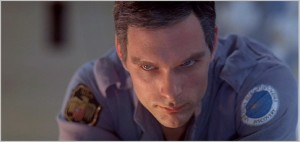2001 is a non-verbal experience; out of two hours and 19 minutes of film, there are only less than 40 minutes of dialogue. I tried to create a visual experience, one that bypasses verbalized pigeonholing and directly penetrates the sub-consciousness with an emotional and philosophic content. To convolute McLuhan, in 2001 the message is the medium. I intended the film to be an intensely subjective experience that reaches the viewer at an inner level of consciousness, just as music does; to ‘explain’ a Beethoven symphony would be to emasculate it by erecting an artificial barrier between conception and appreciation. – Stanley Kubrick
We see Frank and Dave silently eating their food, as a prerecorded BBC interview plays to introduce the astronauts, their situation, and Hal. Why would Kubrick decide to add this silent secondary level of perspective? Is it simply a convenient expository tool, or something else?
Chaplin used a similar gimmick in the feeding-machine scene. Instead of having the accompanying salesmen pitch the machine to the boss, a prerecorded voice lists its attributes while the men silently gesture. Perhaps in this style, Frank, Dave, and Hal lose some aspect of their humanity- instead, they become advanced tools in pursuit of a larger mission. In some regard, what difference do they bear to their sleeping crew mates, who exist solely as a collection of pulsing lines on a screen?
I found many other aspects of 2001 which mimic (or sometimes distort) the silent film drama of Chaplin. In Chaplin’s acting, facial expressions are critical to his universality, and offer some of the most compelling and emotional aspects of his art. This would seem to directly contradict the stone-faced, sharp demeanor of the astronauts and dignitaries of 2001.
But what we see at the end of the film is an unapologetic outpouring of intensity and emotion, told only through facial expressions.
And ironically, the only character who cannot emote via facial movements (Hal) evokes a visceral response from the audience through primarily visual means. The sinister red light that represents Hal is unsettling at best and horrifying at worst. Despite offering no real reason for concern when we initially meet Hal (and indeed, he speaks in a perfectly friendly manner), there is a certain difficulty in trusting a voice embodied by a menacing, unblinking red eye.
Though Modern Times and 2001: A Space Odyssey came out over thirty years apart, the legacy and artistry of silent film continues to live on- even in a genre as modern and futuristic as science fiction. It’s unclear if Chaplin ever saw 2001 (he died about ten years after the film came out), but we can be sure that his sentiments from the end of The Great Dictator still apply:
We think too much and feel too little. More than machinery we need humanity. More than cleverness we need kindness and gentleness. Without these qualities, life will be violent and all will be lost. – Charlie Chaplin
http://www.filmreference.com/Films-Tw-Vi/2001-A-Space-Odyssey.html







